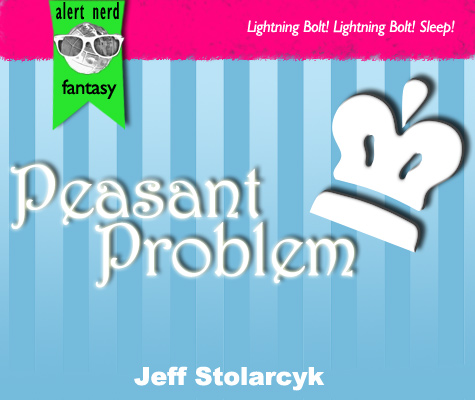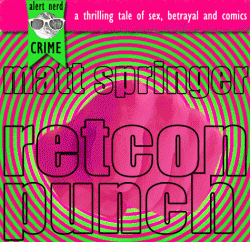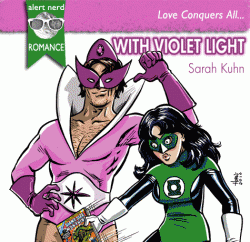The Direct Market: Goodbye, Baby, And Amen.
The Direct Market: Goodbye, Baby, And Amen.
Sep 09

Chris Butcher has a terrific piece up on the failings of the current Diamond distribution system; Tom Spurgeon agrees. I think Frank Santoro got there first.
What struck me most though was a passing comment in Heidi Macdonald’s link to the piece:
We’d quibble with that a little– doing business with multiple distributors is something most retail outlets have to deal with, so for those retailers willing to put on their big boy pants, it’s perfectly fine.
“…something most retail outlets have to deal with…”
“…big boy pants…”
To me, that’s the key here.
If we’re really saying farewell forever to the comics retail direct market as it was known for, what, 20-odd years? then we’re really saying “howdy” to an environment built from the outset to support multiple points of view, to place the power of selling and fostering the artform at the hands of (mostly) intelligent retailers instead of at the whims of a single monolithic terrifying and often incompetent distributor; the comic book store as we knew it will no longer exist, and something better will hopefully take its place.
I feel like it’s time to skip ahead to the end and call this corpse while it’s still fresh. The experiences outlined by Butcher in his piece are undoubtedly the same experiences many savvy comics retailers are already having. These are the folks interested in supporting a variety of artistic viewpoints and serving readers with the type of customer service that nurtures their habits and embraces their enthusiasm, not the “superhero convenience stores” Alan David Doane has written about.
For a retailer like Butcher–or, I expect, Brian Hibbs or James Sime or others across the continent–the direct market isn’t dying; the direct market IS ALREADY DEAD.
Where does this leave us?
Larger and (again, hopefully) better comics retailers will serve customers with a wider variety of material that they acquire through not just Diamond but whatever outlet is available to best facilitate their sales and business strategies.
Many existing comics retailers will quietly close their doors. The extent to which we customers should mourn their demise is a debatable topic; for my part, I’ll only say that these closings will come not at the cold, murdering hands of Diamond’s short-sighted, take-the-money-and-run policies, but through the failure of these retailers to sense the changes in the marketplace and the distribution channels and CHANGE their way of doing business. I think it could be argued that these retailers aren’t just failing as comics sellers; they’re failing as business owners in a capitalist environment. That’s probably a larger topic so I want to leave it there cause I got more shit to spout.
The presence of comics in big-box retailers and through supersellers like Amazon will ultimately be a good thing. They won’t be taking money out of the mouths of struggling direct market retailers anymore; they’ll simply exist as an option alongside the surviving and thriving new breed of retailer, places where you can get everything that isn’t easily available through Amazon, and pick up whatever else floats your boat beside. Big national book retailers will still be there to support sales of mainstream comics to both die-hard and casual fans alike; I think we can already say that from a big bookseller perspective, that “mainstream” already embraces a greater diversity of artistic voices and styles than most direct market stores ever have.
Those creators “frozen out” by Diamond’s collapsing of their own market to basically, I dunno, sell more Deadpool comics or whatever the fuck? Those creators are going to be fine. A rarely-expressed viewpoint when Diamond raised their minimums a few months back was the extent to which any indie comics creator should actually CARE about said raising. I personally fail to see the difference between scratching and biting to get a single floppy of a small black-and-white indie title carried by a distribution system that is largely ignorant to your work’s value; and scratching and biting to provide that same material online where it has a much better shot of finding the readers who will support it and sustain it, whether it be enough to raise your family and make you a workin’ big-shot full-time ARTEEST, or whether it barely covers your hosting costs. Would providing a (very tiny) fraction of (possibly interested) DM retailers with the chance to (maybe) buy 2 copies of your book that will collect dust on a shelf cause maybe they can’t hand sell worth a damn REALLY be the preferable path here? If so, what are you smoking, and may I have some, please?
Slowly, or quickly, Diamond will die. They have pursued the path of least resistance and inevitable decline. Along with Marvel and DC, they seem to have embraced the notion that the network of comics specialty shops exists solely as a delivery mechanism for corporate superhero comics, and that the easy money lies not in nurturing new voices and encouraging independent success, but in bending the shelves with enough goddamned superhero comics to choke a whale. (And I say that as someone who absolutely loves goddamned superhero comics.)
So Butcher’s right–Previews hasn’t changed, except there’s MORE shit from the Big Two, and less diversity in the marketplace. It’s the same old song, with a new melody–keep bleeding dry the nostalgia obsessive crowd with “events” and “tie-in miniseries” and “a series of one-shots that will CHANGE THE UNIVERSE FOREVER.” But how far can this go? Is this sustainable?
It isn’t. It can’t be. The smart retailers already know this and will change; it may not be easy for them, but I think from a business perspective, it’s probably better in the long run. It breaks the Diamond stranglehold thanks to Diamond’s own horseshit policies.
The smart retailers will be fine. Good comics will still be available from a wide variety of sources. Young creators have more tools than EVER at their disposal to put out quality work and have it discovered by a sizable audience.
Everything’s gonna be fine. It might even be better. We just need to get through the wake and the funeral of Diamond Comics Distribution and encourage the good retailers we love to put on their “big boy pants” (if they haven’t already) and come into their own.
Comics, as always, as ever, will survive.
(DISCLAIMERS: I am not a comics retailer. I have only anecdotal experience in comics retail. I majored in English, not business; I don’t have an MBA. I’m rushing a little cause I need to walk the dog or he’s gonna shit on my floor. It’s 6:30 in the morning. I’m a little groggy.)











I think digital distribution is also going to play a role in this – maybe not in the short run, but years down the line. I would gladly switch to electronic formats for a tier of books that I like to follow but don’t need to collect.
A part of the equation you’re missing is the cold hard fact that comics are a business, as well as an art. Until “good comics” creators can play the game–and play it with some degree of regularity, many retailers will take the road of least resistance and be content to sell yet another Deadpool comic while not losing any sleep waiting for fill-in-the-blank “good comic”.
And until you can convince many readers that only the comics you deem to be “good” actually are, it’s going to be a long road from here to there. There’s a dearth of marketing savvy among art and indie comics creators/publishers. They are as guilty of the “throw it against the wall and see if it sticks” method of marketing as the Big Two are.
It’s my experience as a retailer for the past 21 years that a large share of comic buyers/readers have wider tastes than what blogs like this give them credit for. It’s not at all uncommon to have buyers in my shop have both a Batman comic and a Jason graphic novel in their buy pile, as an example.
Better direct market retailers will still make the effort to seek out new and innovative material from all corners of the comicsphere. Hopefully, creators and publishers can meet us halfway.
I’m trying to find the part in this post where Matt attacks direct market retailers en masse, but I mostly find a lot of negativity about Diamond and some pie in the sky notions about the future of publishing in a Web 2.0 world. There’s nothing, except the title – which is a bit sensationalist and all, but it’s a title – that condemns the comic shop as an entity and in fact praises ‘good’ comics retailers for keeping their eye on small press work when it would be easier to ignore it.
We love comic shops here. We’ve written about that quite a few times.
I concede your point readily about first time or indie creators not being very savvy about marketing their books. I think a lot of them don’t know what to do next after they make the book; it’s the Underpants Gnome plan all over again. Why? Because some creators suck at it because they’re creators and not marketers or publicists. Because some creators are just trying to get a foot in the door and don’t have the experience yet. You ask any pro how to get started in comics, and they’re going to tell you to produce a book yourself. But nobody’s there, by and large, to tell you how to make that book sell.
I’m not saying this obligates any retailer to look under every rock until they find the next Johnny Ryan or whoever, but that it’s a bit on the nose to put the blame entirely on the creators’ shoulders, especially when they’re completely shut out of the major catalog in the industry. The point was that this cold shoulder from Diamond matters less to creators and to shops now than it would have in the past.
Joe, you make some good points, and I think we’re on the same page ultimately–my main point overall (which I hope I conveyed relatively clearly) was simply that good retailers will be relying less and less on the Direct Market, and bad retailers will probably be relying on it more and more, to the point where things will inevitably have to start changing or breaking or dying off completely.
(The title I almost gave this post was “Adapt Or Die,” which is just about what I think in 3 tiny words instead of however many are clogging up the internet above.)
I do agree–comics readers have great taste overall. This isn’t about a failing on the part of readers–it’s about how I think the failures on Diamond’s part to properly serve a changing marketplace will have a big impact on that marketplace in the future. And I think you’re right–there’s bad marketing in comics on the creator/publisher side, although I think it’s a vast minority compared to those creators and publishers who do an excellent job of providing and selling exceptional work.
Again, this isn’t about that–separate conversation. What’s changing from my anecdotal, armchair observer viewpoint is the distribution piece between creator/publisher and retailer, and I think that will have a big impact on things to come.
I sell comics for a living and I think that “looking under every rock until they find the next Johnny Ryan or whoever” is one of the most important (and fun) parts of the job! There’s lots of good stuff out there and I want to introduce my customers to it. One quick look at my in-box makes me think creators are doing a pretty decent job at letting me know what they’re making, but it’s my job to make sure I see as much of what’s out there as humanly possible… and that’s the entire reason I started doing an annual mini-comic award seven years ago. It helped me find folks like Josh Cotter and Danica Novgorodoff (two amazing creators who won that award and have since gone on to much bigger things). That’s good for those just-getting-started creators, and also my business, my personal funnybook collection, *and* for the larger world of comics in general too. Yay!
I do agree on your thoughts about the direct market, at least as how it pertains to retailers like myself. My shop hasn’t ever been a DM store. Sure, Diamond and I do a lot of business together but I’ve always done a lot of business with other distributors and publishers who sell comics too. Why would I want to limit my purchasing options?
PS Thanks for the kind words!
What is unfortunate is that back when people tried to get anti-trust regulation to apply to the Diamond monopoly- it failed. If we had strong viable competition in the comics distro business, I think it would contribute to a healthier, well-rounded industry.
On the whole I agree that we are in the “Death-Rattle” phase of direct sales. But not for all stores- there are a number of comics retailers out there who are very savvy and will be able to roll past success/history and diversity of marketing strategies to continue their longevity. POD services like Ka-Blamm’s direct-to-retailer program will become more prevalent; some smart indy print and webcomic publishers will figure out a way to bridge the web divide with retailers to expand their markets and I imagine by the next 3-5 years a new “retail” system will assert itself.
I agree wholehartedly; “…the whims of a single monolithic terrifying and often incompetent distributor…” should not be allowed any longer to curtail the natural and necessary growth of the artform/industry we all love to be a part of. Diamond has made enough dinosaur-moves and some frankly regressive, expansionist (and yes, ANTI-TRUST-ish)tactics for me to see its demise as justifiable.
I hope that all of you comics editorial prognosticators, having clearly raised the lanterns and rang the klaxon enough times- will start to brain-dump the new manifesto(s) and theories of implementation for the new way to do business. We need some Bruce Sterlings to assert this stuff and get the conversation rolling yesterday.
PAX PER COMIC LIBRI.